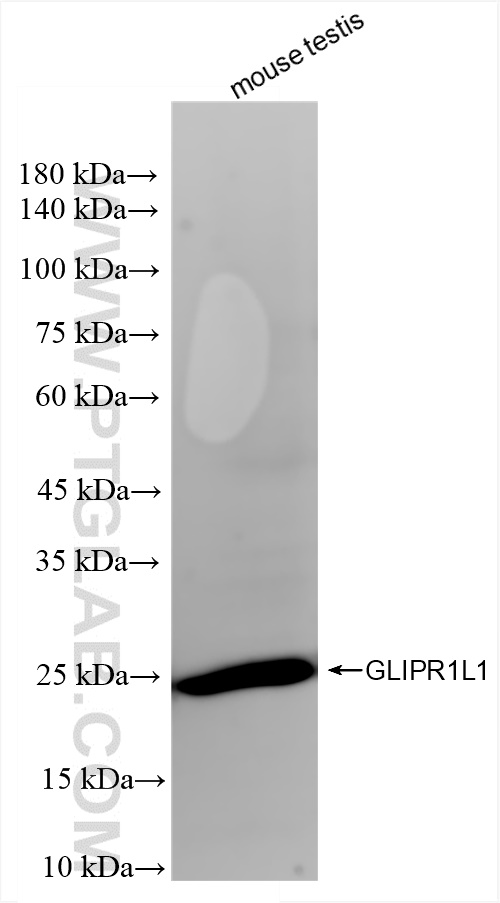验证数据展示
经过测试的应用
| Positive WB detected in | human testis tissue, mouse testis tissue |
| Positive FC (Intra) detected in | PC-3 cells |
推荐稀释比
| 应用 | 推荐稀释比 |
|---|---|
| Western Blot (WB) | WB : 1:2000-1:10000 |
| Flow Cytometry (FC) (INTRA) | FC (INTRA) : 0.25 ug per 10^6 cells in a 100 µl suspension |
| It is recommended that this reagent should be titrated in each testing system to obtain optimal results. | |
| Sample-dependent, Check data in validation data gallery. | |
产品信息
83584-3-RR targets GLIPR1L1 in WB, FC (Intra), ELISA applications and shows reactivity with human, mouse samples.
| 经测试应用 | WB, FC (Intra), ELISA Application Description |
| 经测试反应性 | human, mouse |
| 免疫原 |
CatNo: Ag14852 Product name: Recombinant human GLIPR1L1 protein Source: e coli.-derived, PGEX-4T Tag: GST Domain: 23-233 aa of BC014603 Sequence: SKIPSITDPHFIDNCIEAHNEWRGKVNPPAADMKYMIWDKGLAKMAKAWANQCKFEHNDCLDKSYKCYAAFEYVGENIWLGGIKSFTPRHAITAWYNETQFYDFDSLSCSRVCGHYTQLVWANSFYVGCAVAMCPNLGGASTAIFVCNYGPAGNFANMPPYVRGESCSLCSKEEKCVKNLCKNPFLKPTGRAPQQTAFNPFSLGFLLLRIF 种属同源性预测 |
| 宿主/亚型 | Rabbit / IgG |
| 抗体类别 | Recombinant |
| 产品类型 | Antibody |
| 全称 | GLI pathogenesis-related 1 like 1 |
| 别名 | 240594D10, ALKN2972, GLIPR1 like protein 1, GLIPR1-like protein 1, PRO7434 |
| 计算分子量 | 242 aa, 27 kDa |
| 观测分子量 | 25 kDa |
| GenBank蛋白编号 | BC014603 |
| 基因名称 | GLIPR1L1 |
| Gene ID (NCBI) | 256710 |
| RRID | AB_3671198 |
| 偶联类型 | Unconjugated |
| 形式 | Liquid |
| 纯化方式 | Protein A purification |
| UNIPROT ID | Q6UWM5 |
| 储存缓冲液 | PBS with 0.02% sodium azide and 50% glycerol, pH 7.3. |
| 储存条件 | Store at -20°C. Stable for one year after shipment. Aliquoting is unnecessary for -20oC storage. |
实验方案
| Product Specific Protocols | |
|---|---|
| WB protocol for GLIPR1L1 antibody 83584-3-RR | Download protocol |
| Standard Protocols | |
|---|---|
| Click here to view our Standard Protocols |





